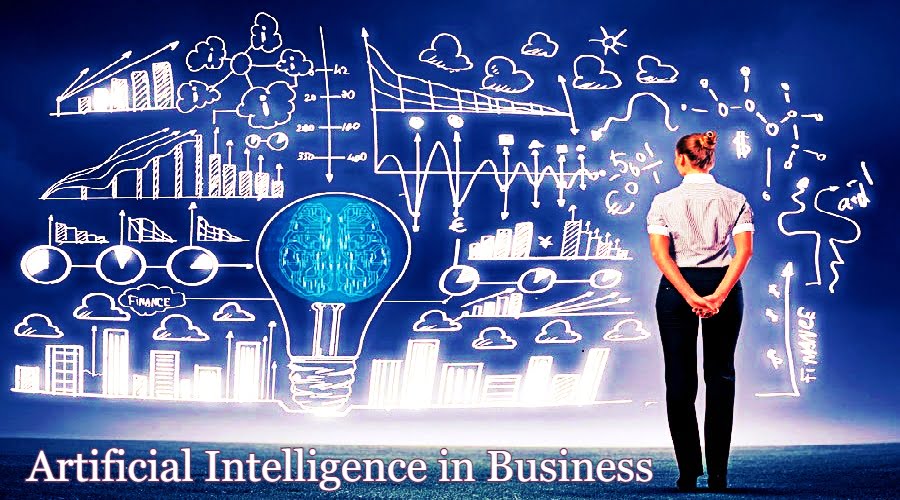Artificial intelligence is generally seen as a supportive tool. AI technologies are becoming imperative for businesses that want to maintain a competitive edge. There are many uses of artificial intelligence in business. Here we will give you the top 5 examples of using AI in business.

How Artificial Intelligence is Being Used in Business?
You’ve been hearing about the concept of artificial intelligence for a long time, but it’s still one of those futuristic novelty things that’s always in tomorrow.
Artificial Intelligence starts from a concept that has evolved over time, and that has to do with the idea of building machines capable of thinking like human beings.
Business AI simply involves using intelligent computer programs with human-like capabilities to automate business processes, detect fraud, provide predictive analysis, improve customer experience, increase productivity and efficiency, drive business growth and transformation, and boost sales and revenue.
All kinds of companies in the industrial and service sectors use AI applications to achieve precise objectives due to their ability to transform data into useful and valuable information.
Machine Learning is an AI application that provides the quality of learning by itself through the scientific study of algorithms and statistical models capable of automatically improving from experience, and without depending on prior programming.
Artificial intelligence is already present in much more things than we think and more within reach than we think. Therefore, I would like to show how entrepreneurs and businesses of all kinds are using AI technology and how AI technology is changing everything.
5 Applications of Artificial Intelligence in Business
There are many uses of artificial intelligence in business. Let’s have a look at the top 5 real-world applications of AI in business.
1. Artificial Intelligence (AI) Marketing
Marketing is more about science than art. The constant collection of data on the effectiveness of the ads, as well as the continuous improvement of the campaigns according to what that data says, is the “secret” to success.
And yes, it is a boring task, I will not deny it, but very profitable. In these cases, artificial intelligence begins to be of great help because, again, it especially shines in these kinds of scenarios.
Artificial intelligence can be used to streamline and optimize marketing campaigns, eliminate the risk of human error, boost the return on investment (ROI).
AI has the potential to create content, then put it in front of the right people on the right platforms and help marketers map out an end-to-end content marketing strategy.
2. Artificial Intelligence in Content Marketing
Artificial Intelligence plays a significant role in the field of content marketing, helping to generate content, build a content strategy, and personalize content, and much more.
AI tools help create commercial content and texts ( copywriting ), a fundamental part of the marketing and communication of any company.
AI technology streamlines processes at a time of immense content overload and helps marketers decipher the ever-changing world of content marketing.
Artificial Intelligence allows marketers to use machine learning algorithms to optimize content for consumption and distribution and enhances the customer experience by being timely and relevant, and providing better context.
3. Artificial Intelligence in Finance
One of the most important fields in which artificial intelligence has been very present for some time is finance. It is not surprising, since it is an activity that requires deep analysis and quick decisions, based on a large amount of data.
When it comes to something like that, artificial intelligence has many advantages.
The use of algorithms is increasing on the stock market and, what was the heritage of a few with a lot of power, is now available to everyone.
In finance, AI technology offers endless possibilities and resources for investors of different profiles.
4. Artificial Intelligence in Business Decision Making
Artificial intelligence helps businesses develop new ideas, gain better insights, and improve business decision-making.
Artificial intelligence enables companies to process a large volume of data in real-time. Through this, AI provides meaningful insights that can solve recurring business problems.
Companies can make a large number of benefits through the use of artificial intelligence. For example, they can identify inconsistencies in their operations and anomalies in their patterns to rewrite their processes. Not only this, but through the in-depth analysis that artificial intelligence provides, companies can also determine the root cause of the problems they face.
By analyzing exploratory and predictive data, companies can minimize risk and maximize the effectiveness of their business decision-making process.
Companies can not only capitalize on short-term opportunities but also increase long-term profits and revenues.
From choosing the best daily logistics route for a huge number of vehicles (correcting in real-time if necessary) to dynamic price calculation, artificial intelligence has a big impact on business, much more than we think.
Many times the complexity of marketing decisions creates an obstacle to making accurate predictions. AI can help make good short-term and long-term marketing decisions with some insights.
AI systems can aid real-time decision-making through a decision support system that also aids in forecasting, data mining, and useful analysis of recent trends.
Make decisions in real-time based on a huge amount of data and anticipate others according to what you have learned in that time.
5. Artificial Intelligence in Industrial Production
Artificial intelligence is an essential component of the Industry 4.0 revolution. Various industries are using assisted, augmented, or autonomous intelligence to improve production processes and operations. Currently, half of the organizations around the world invest in some type of Artificial Intelligence, and two-thirds plan to do so in three years.
AI algorithms are not limited to use cases from the production floor, they can also be used to improve manufacturing supply chains, helping companies anticipate market changes.
Artificial Intelligence is improving industrial processes, creating new ways of working, and making a new generation of machines smarter.
Artificial intelligence learns on its own about what happens, the hours of sunshine each day, the power generated, the power consumed, etc., so that it can manage the small production plant in a much more efficient way.
Under this great label are many technologies that emulate the capabilities of human intelligence, such as robotic process automation, machine learning, natural language processing, and neural networks.






Pingback: Top 10 Technology Trends You Need to Know for 2022 – SciTech Society